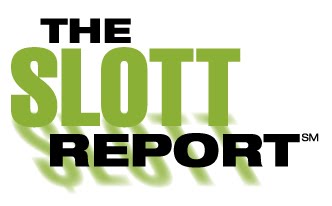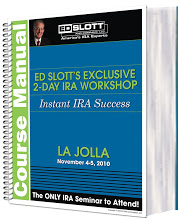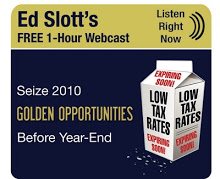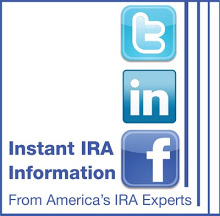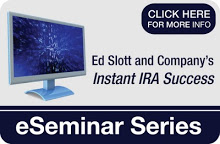Much has been said in the news media about required minimum distribution (RMD) relief for seniors for 2008. Suggestions range from suspending distributions entirely for 2008, to allowing the use of lower account balances for calculating those distributions. As a result, we receive many questions on the prospect of relief for RMDs. All of the proposals will create a host of issues to deal with, for retirement account owners, their advisors and the IRS. One of the biggest issues is how to accommodate individuals who have already taken their RMDs for 2008. Tom Herman wrote an article on this very issue in the November 19th edition of The Wall Street Journal. You can CLICK HERE to read the full article and follow below for key excerpts from “Feds Rethinks Rules on Retirement Savings.”
Excerpts from the Article:
"Although it is still possible that Congress could act this week" to provide relief from the minimum-distribution rules, "that hope seems to be fading," says Deloitte's Mr. Stretch. But if Congress doesn't act, "Treasury seems ready to make regulatory changes that would help out taxpayers."
"I think they [Treasury officials] have the authority to lessen the amount of the required minimum distribution, but I'd find it hard to think they have the authority to eliminate it completely," says Bill Sweetnam, an attorney at the Groom Law Group in Washington and formerly the benefits tax counsel at the Treasury Department.
On another front, there is a new bill, the “Worker, Retiree, and Employer Recovery Act of 2008” proposed in the Senate that includes a provision to suspend RMDs for 2009. But don’t count on this folks! It is only proposed and has not passed either the House or the Senate. With Congress taking time off for both Thanksgiving and Christmas before the end of the year, chances of its passage are not good before 2009.
Monday, November 24, 2008
Thursday, November 20, 2008
The Decisions in Retirement
A NEW Year means a NEW beginning - a fresh start for financial savings. You or your client has just retired or is nearing retirement. Perhaps they have just switched jobs or have been downsized and are staring at a sizable retirement account.
NOW WHAT?
How does a consumer answer this question, and on the flip side, what questions does an advisor ask to make an option clearer? They are one and the same, as the client and financial advisor are a team whose sole goal is to keep more of your hard-earned money and protect it in retirement!
There are three choices for what to do with your money:
· Option #1: Roll over to an IRA
· Option #2: Stay put in the company plan or roll to a new employer's plan
· Option #3: Take a lump-sum distribution and pay the tax now
Each option’s pluses and minuses are contingent upon a series of questions you must answer or an advisor must ask during an initial planning meeting with current and prospective clients.
1. When will you need the money?
2. What will your tax bracket be in retirement?
3. How is your health?
4. How much money will you need for retirement?
5. How much is the lump-sum distribution?
6. How old are you?
7. What is your estate plan?
8. Who will pay the income tax?
9. Will you be working again?
10. Is creditor protection a big issue for you?
You can read through the pages of Ed’s book, “The Retirement Savings Time Bomb…And How To Defuse It” to get more detailed explanations on the above questions. It is VERY important that all consumers know the answers to these questions and that advisors have the knowledge to ASK! The answers to the questions will help determine what road to venture down with a retirement nest egg.
NOW WHAT?
How does a consumer answer this question, and on the flip side, what questions does an advisor ask to make an option clearer? They are one and the same, as the client and financial advisor are a team whose sole goal is to keep more of your hard-earned money and protect it in retirement!
There are three choices for what to do with your money:
· Option #1: Roll over to an IRA
· Option #2: Stay put in the company plan or roll to a new employer's plan
· Option #3: Take a lump-sum distribution and pay the tax now
Each option’s pluses and minuses are contingent upon a series of questions you must answer or an advisor must ask during an initial planning meeting with current and prospective clients.
1. When will you need the money?
2. What will your tax bracket be in retirement?
3. How is your health?
4. How much money will you need for retirement?
5. How much is the lump-sum distribution?
6. How old are you?
7. What is your estate plan?
8. Who will pay the income tax?
9. Will you be working again?
10. Is creditor protection a big issue for you?
You can read through the pages of Ed’s book, “The Retirement Savings Time Bomb…And How To Defuse It” to get more detailed explanations on the above questions. It is VERY important that all consumers know the answers to these questions and that advisors have the knowledge to ASK! The answers to the questions will help determine what road to venture down with a retirement nest egg.
It is Time for IRA Conversions
The holidays are upon us and a New Year is fast approaching. It is also the time for IRA conversions. Ed Slott, America’s IRA Expert, recently wrote an article for Investment News that deals with this very subject. You can CLICK HERE to read the article and then study the examples and added information below.
The Roth recharacterization and reconversion rules essentially dictate that you can only convert the funds from an IRA to a Roth IRA once PER YEAR. You must wait at least 30 days after doing a recharacterization (moving the funds from a Roth IRA back to a traditional IRA) to reconvert the funds to a Roth IRA OR you must wait until the following year, whichever is later.
Here are several examples that emphasize the point. You convert to a Roth IRA in 2008. You have until October 15, 2009 to do a recharacterization. (a) You recharacterize in November, 2008. You must wait until 2009 to reconvert. (b) You recharacterize on December 15, 2008. You must wait 30 days to reconvert. (c) You recharacterize in March, 2009. You must wait 30 days to reconvert.
Tax Trap on Recharacterizations
We always recommend that you pay the taxes owed on the conversion from outside funds. That gives you the most money in the Roth IRA to grow and compound income tax free. But many taxpayers either have funds withheld from the IRA distribution to pay the income tax or take a withdrawal from the Roth IRA to pay the income tax. When those taxpayers later decide to do a recharacterization, they cannot recharacterize the entire amount distributed from the IRA because they used a portion of the distribution to pay their taxes. After doing a recharacterization of the remaining amount converted, the amount used to pay the income taxes on the original conversion will remain a taxable amount on the individual’s tax return and will be subject to the 10% early distribution penalty if the individual is under age 59 ½.
Example: Tiffany takes a distribution of $100,000 from her IRA. She has $85,000 transferred to a Roth IRA and $15,000 withheld for income taxes. A year later, her Roth IRA is worth only $50,000 so she decides to do a recharacterization. She can not recharacterize the $15,000 withheld for income taxes. Tiffany will have to include that amount in her income for the year and pay the 10% penalty since she is under age 59 ½.
The Roth recharacterization and reconversion rules essentially dictate that you can only convert the funds from an IRA to a Roth IRA once PER YEAR. You must wait at least 30 days after doing a recharacterization (moving the funds from a Roth IRA back to a traditional IRA) to reconvert the funds to a Roth IRA OR you must wait until the following year, whichever is later.
Here are several examples that emphasize the point. You convert to a Roth IRA in 2008. You have until October 15, 2009 to do a recharacterization. (a) You recharacterize in November, 2008. You must wait until 2009 to reconvert. (b) You recharacterize on December 15, 2008. You must wait 30 days to reconvert. (c) You recharacterize in March, 2009. You must wait 30 days to reconvert.
Tax Trap on Recharacterizations
We always recommend that you pay the taxes owed on the conversion from outside funds. That gives you the most money in the Roth IRA to grow and compound income tax free. But many taxpayers either have funds withheld from the IRA distribution to pay the income tax or take a withdrawal from the Roth IRA to pay the income tax. When those taxpayers later decide to do a recharacterization, they cannot recharacterize the entire amount distributed from the IRA because they used a portion of the distribution to pay their taxes. After doing a recharacterization of the remaining amount converted, the amount used to pay the income taxes on the original conversion will remain a taxable amount on the individual’s tax return and will be subject to the 10% early distribution penalty if the individual is under age 59 ½.
Example: Tiffany takes a distribution of $100,000 from her IRA. She has $85,000 transferred to a Roth IRA and $15,000 withheld for income taxes. A year later, her Roth IRA is worth only $50,000 so she decides to do a recharacterization. She can not recharacterize the $15,000 withheld for income taxes. Tiffany will have to include that amount in her income for the year and pay the 10% penalty since she is under age 59 ½.
Tuesday, November 18, 2008
A New Day with the Same Mission
Election Day has come and gone. We have a new President-elect of the United States, and with it new economic policy and philosophy. Yet, new leadership does not change the overarching mission of our business: to match consumers with competent, educated financial advisors!
This is just a reminder that even though we’ve turned a new page in American politics, you must move ahead down the continuous path of IRA education in order to best serve your clients.
Our last 2008 2-Day IRA Workshop, Instant IRA Success, begins tomorrow at the Westin Galleria in Dallas, Texas, but don’t forget that you can proactively plan for the New Year by registering early for our first workshop of 2009 at the Renaissance Harborplace Baltimore on March 27-28.
If we don’t see you in Dallas, we look forward to spending valuable time with you during March in Baltimore!
This is just a reminder that even though we’ve turned a new page in American politics, you must move ahead down the continuous path of IRA education in order to best serve your clients.
Our last 2008 2-Day IRA Workshop, Instant IRA Success, begins tomorrow at the Westin Galleria in Dallas, Texas, but don’t forget that you can proactively plan for the New Year by registering early for our first workshop of 2009 at the Renaissance Harborplace Baltimore on March 27-28.
If we don’t see you in Dallas, we look forward to spending valuable time with you during March in Baltimore!
Update on the Financial Crisis
How do you put a price tag on the economy’s strong foundation? The federal government attempted to try late last week, passing a revised version of a $700 billion bailout constructed to re-build a fractured credit and banking industry and revitalize a troubled economic core.
In the end, the recent financial crisis has made one fact in our industry very apparent.
You CAN’T control the volatile stock market, which has plummeted with the sobering news of bank mergers and housing foreclosures and hasn’t stopped falling even with the government rescue plan.
However, you CAN control tax liability through IRA distribution planning techniques that can help consumers hold on to their hard-earned money.
The message is clear: Consumers are confused, even scared, about their financial future and are URGENTLY searching for educated financial advisors who can provide them with financial security!
You can MAKE A DIFFERENCE with the proper training and expertise necessary to navigate these fragile economic times. The financial turmoil should NOT be a deterrent to your business, but rather AN OPPORTUNITY to stand apart from other advisors and steer your current and prospective clients away from immediate panic toward long-term financial success!
In the end, the recent financial crisis has made one fact in our industry very apparent.
You CAN’T control the volatile stock market, which has plummeted with the sobering news of bank mergers and housing foreclosures and hasn’t stopped falling even with the government rescue plan.
However, you CAN control tax liability through IRA distribution planning techniques that can help consumers hold on to their hard-earned money.
The message is clear: Consumers are confused, even scared, about their financial future and are URGENTLY searching for educated financial advisors who can provide them with financial security!
You can MAKE A DIFFERENCE with the proper training and expertise necessary to navigate these fragile economic times. The financial turmoil should NOT be a deterrent to your business, but rather AN OPPORTUNITY to stand apart from other advisors and steer your current and prospective clients away from immediate panic toward long-term financial success!
Subscribe to:
Posts (Atom)
